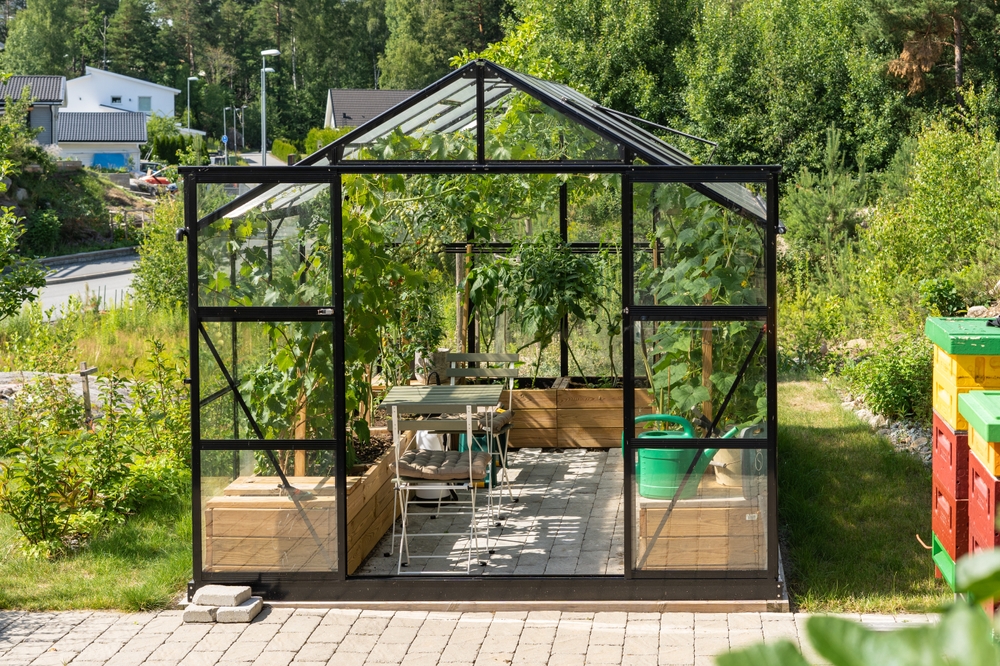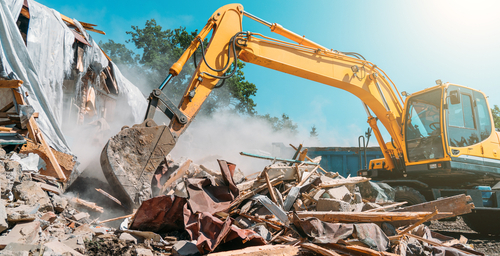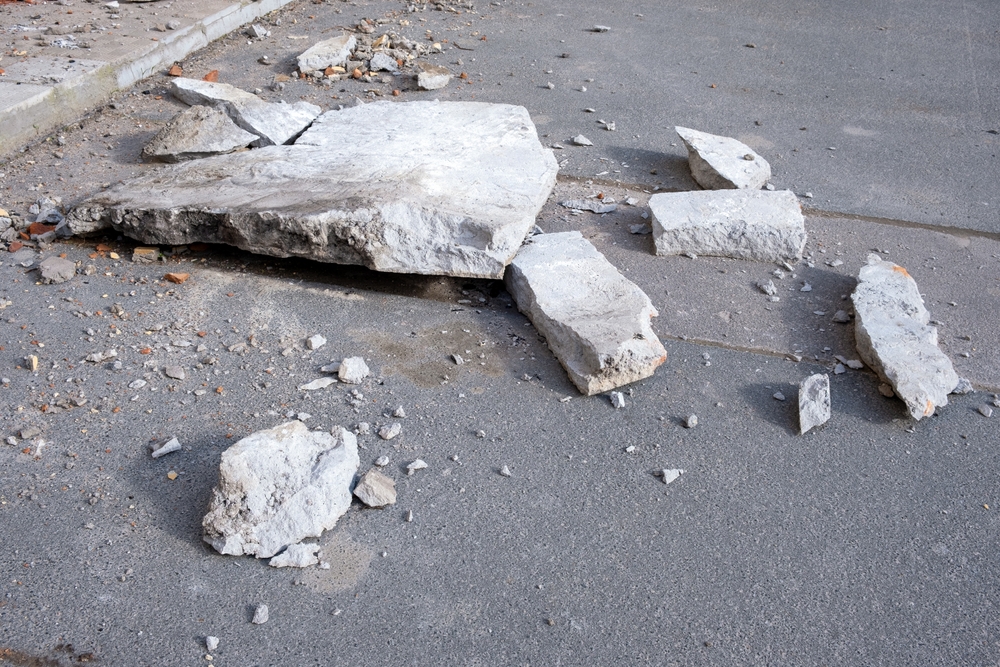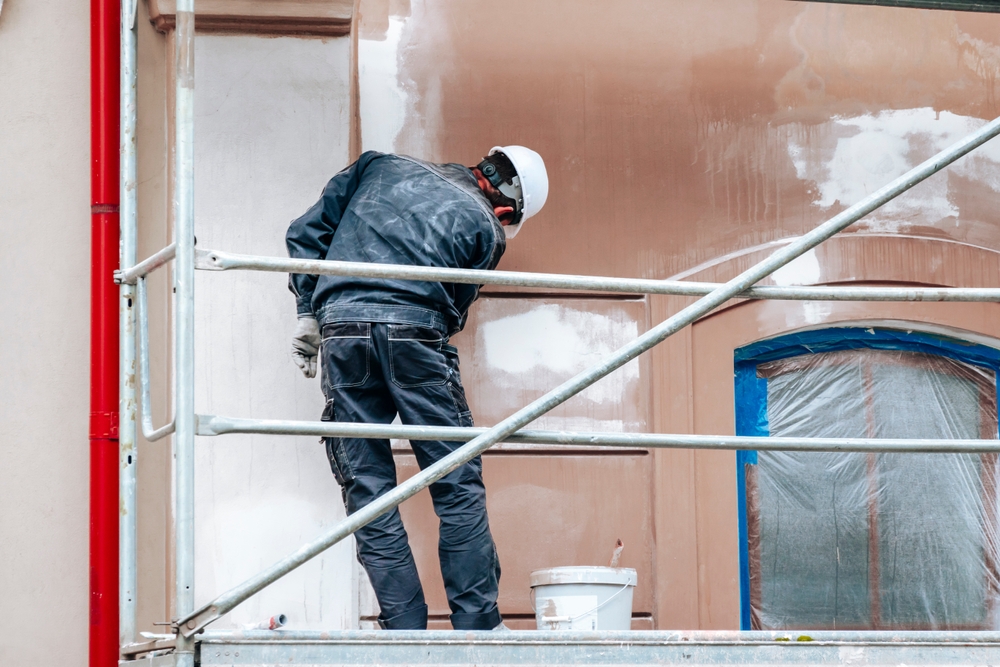May 16, 2024 - Benjamin Ehinger
Construction Waste Bins: Optimizing On-Site Waste Management
CALL NOW 844-762-8449
Managing construction waste effectively is essential, not just for maintaining a clean job site, but also for complying with local regulations and minimizing environmental impact. As a contractor or site manager, it’s crucial to understand the variety of waste produced during construction projects and how to deal with it properly. This includes knowing how to select the right size and type of dumpster for various kinds of construction waste, from excess building materials to demolition debris.
Efficient waste management on construction sites means more than just having a place to throw away trash. It involves a thoughtful approach to the kind of waste generated, the volume, and how frequently it needs to be removed. Properly optimizing job site operations and understanding waste management protocols are key to running a smooth construction project. Additionally, special considerations must be given to heavy or hazardous materials that require special disposal methods to ensure safety and compliance with building codes.
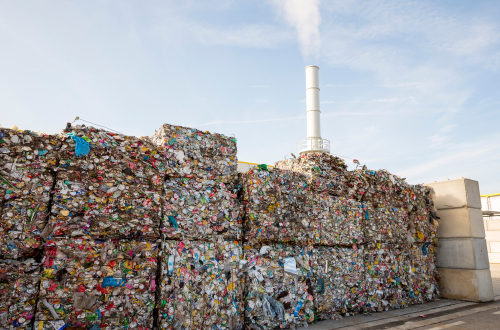 In managing waste on a construction site, you must adhere to specific protocols to maintain regulatory compliance and ensure efficient waste segregation and disposal.
In managing waste on a construction site, you must adhere to specific protocols to maintain regulatory compliance and ensure efficient waste segregation and disposal.
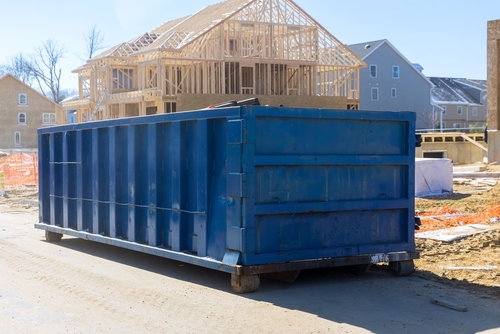 When managing construction waste, the effectiveness of services provided can significantly determine the efficiency and compliance of your project. Comprehensive services encompass everything from initial consultation to flexible waste management solutions, tailored to meet your unique project requirements.
When managing construction waste, the effectiveness of services provided can significantly determine the efficiency and compliance of your project. Comprehensive services encompass everything from initial consultation to flexible waste management solutions, tailored to meet your unique project requirements.
Key Takeaways
- Effective construction waste management is crucial for compliance and environmental responsibility.
- Choosing the appropriate dumpster size and type is essential for efficient waste disposal.
- Special handling is required for heavy or hazardous construction debris to ensure safety and regulation adherence.
Understanding Construction Waste
In the realm of construction and demolition, you’ll encounter a variety of waste materials, ranging from concrete to wood, each with its own disposal considerations and environmental impacts. Your awareness and management of these materials can greatly enhance sustainability practices within the industry.Types of Construction Waste
Concrete: Heavily used in construction, concrete can be crushed and recycled as a base for roadways or construction fill. Brick: Similar to concrete, bricks also have a high potential for reuse and recycling, saving resources and reducing landfill usage.- Wood: Often found in the form of dimensional lumber, wood waste can be recycled into products like particle board or used as biomass fuel.
- Asphalt: Primarily from roofing shingles and road projects, asphalt waste can be reprocessed into new asphalt.
- Soil: Clean soil can be reused on site or in other construction projects, while contaminated soil requires special disposal procedures.
Environmental Impact of Construction Waste
The disposal and mismanagement of construction waste can lead to soil and water pollution, contributing to greenhouse gas emissions. On the flip side, recycling materials like concrete and brick can conserve resources and reduce the carbon footprint of new construction. Your choice to repurpose wood and asphalt can greatly divert waste from landfills, while proper disposal and treatment of soil and drywall prevent hazardous chemicals from leaching into the environment.Choosing the Right Dumpster for Construction Waste
Selecting an appropriate dumpster for construction waste is critical to the success of your project’s waste management plan. You’ll need to consider dumpster sizes and types to ensure you have the capacity and functionality required for the materials you’ll be disposing of.Assessing Dumpster Sizes
- 10-Yard Dumpster: Ideal for small renovation projects or heavy waste like concrete.
- 20-Yard Dumpster: Suits mid-sized projects such as room remodels or large item disposals.
- 30-Yard Dumpster: A good fit for new home construction or major renovation debris.
- 40-Yard Dumpster: The largest option, perfect for commercial construction projects with substantial waste.
Different Types of Dumpsters
Roll-Off Dumpsters: These are open-top containers that are commonly used in construction sites. They are designed to handle heavy materials and are available in multiple sizes. Commercial Dumpsters: Not typically used for heavy construction waste, these are better for businesses with regular trash pickup needs. When choosing, consider not just the size, but also the type of construction dumpster related to your waste. If the waste includes heavy materials like bricks or metal, opting for a roll-off dumpster is essential to accommodate the weight and ease of disposal.Waste Management Protocols
 In managing waste on a construction site, you must adhere to specific protocols to maintain regulatory compliance and ensure efficient waste segregation and disposal.
In managing waste on a construction site, you must adhere to specific protocols to maintain regulatory compliance and ensure efficient waste segregation and disposal.
Regulatory Compliance
Your construction waste management practices must follow local and federal regulations to prevent potential fines and project delays. You are responsible for identifying applicable waste management guidelines, including requirements for permits and waste tracking. Ensure that your construction debris is disposed of at authorized landfills or recycling facilities. Keep accurate records of the waste removal process, detailing the types of waste, quantities, and the disposal or recycling locations.Waste Segregation and Disposal
Segregating waste into categories, such as recyclables, hazardous materials, and general waste, is essential. This not only simplifies waste removal but also facilitates recycling efforts, reducing materials sent to landfills. Here’s how you can organize your waste segregation strategy:- Recyclables: Implement clear labeling on bins to differentiate between wood, metal, and plastic.
- Hazardous Materials: Isolate and handle hazardous waste according to safety protocols to prevent contamination.
- General Waste: Utilize designated containers for waste not suitable for recycling.
Optimizing Job Site Operations
To enhance efficiency on your job site, strategic positioning of waste bins and meticulous planning of waste removal schedules are key factors.Effective Site Layout for Waste Bins
Your job site can run more effectively with a well-thought-out layout for waste bins. Position your bins to allow for easy access by workers handling heavy debris and to facilitate swift pick-up by the construction dumpster rental service. It’s crucial to place dumpsters close to demolition areas or roof tear-offs but ensure they do not obstruct site movement.- Demolition Projects: Near the demolition zone to reduce the distance of debris hauling.
- Roof Tear-offs: At a convenient spot where roofing materials can be safely discarded.
Scheduling and Logistics
Proper scheduling and logistics play an important role in optimizing waste management at your job site. Coordinate the delivery and removal of dumpsters according to the project’s timeline.- Initial Drop-off: Schedule the arrival of the dumpster to coincide with the start of waste generation.
- Routine Pick-up: Regular intervals for waste collection can prevent overflow and sustain site cleanliness.
- Final Removal: Plan for the last waste pick-up to clear the site upon job completion.
Special Considerations for Heavy Debris
When dealing with heavy debris, it’s crucial to know the limitations and requirements that come with it to avoid costly fines and operational delays.Material-Specific Bins
For heavy materials like concrete, dirt, and brick, it’s essential that you select the appropriate containers designed to withstand such weight. These material-specific bins are reinforced to ensure they can hold heavy loads without damage. Be aware that using a general-purpose dumpster for heavy debris can result in container breakage or waste spillage, which you definitely want to avoid.Weight Limits and Overages
Every construction bin has a weight limit, which you must respect to ensure safety and compliance with local regulations. When renting a bin, it’s critical to discuss the covered weight limit with the rental company. Going over this limit can lead to overage charges that can significantly increase project costs. Keep in mind that materials like dirt can be heavier than you anticipate, especially when wet. Always estimate your debris weight conservatively, and if necessary, opt for multiple pickups to manage overages efficiently.Comprehensive Services for Construction Projects
 When managing construction waste, the effectiveness of services provided can significantly determine the efficiency and compliance of your project. Comprehensive services encompass everything from initial consultation to flexible waste management solutions, tailored to meet your unique project requirements.
When managing construction waste, the effectiveness of services provided can significantly determine the efficiency and compliance of your project. Comprehensive services encompass everything from initial consultation to flexible waste management solutions, tailored to meet your unique project requirements.
Support and Consultation
Your project deserves expert attention right from the start. With dedicated account managers, you’ll receive personalized advice for your construction waste needs. They serve as your one point of contact, streamlining communication and ensuring that your queries and concerns are addressed promptly. A clear understanding of service areas is crucial, and your account manager will confirm availability and assist with construction dumpster rental provisions specific to your location.- Personal Touch: You are assigned an account manager to help tailor services to your project.
- Expert Guidance: Access to adept support for rental selection and waste management planning.
Value-Added Services
Optimizing waste management goes beyond just bin rentals. Enjoy the benefits of value-added services that include flexible scheduling options to accommodate the unpredictability of construction timelines. Whether you need a roll-off dumpster for heavy debris or multiple units for different waste streams, the right solution is at hand. Services are designed for ease, offering a variety of dumpster sizes and materials handling.- Flexible Options: Easy scheduling to suit project phases, saving you from unnecessary delays.
- Tailored Solutions: Various dumpster types and sizes for efficient segregation and disposal.
Navigating Local Regulations and Building Codes
When planning a construction project, understanding the local regulations and building codes in your area is crucial. These laws govern the use of construction waste containers and ensure responsible waste management. Non-compliance can lead to legal issues and possible project delays.Navigating Local Regulations
Local regulations can vary significantly from one municipality to another. For example, in San Diego, CA, the regulations might differ from those in Aliso Viejo, CA. It’s essential that you review your city’s exact requirements. In New York City, NY, for instance, specific rules govern where a bin can be placed and for how long. Louisville, KY, may have distinct permit requirements for placing a construction bin in a public space. Here’s how you can stay compliant:- Contact Local Authorities: Reach out to your city’s waste management department.
- Permit Acquisition: Check if you need a permit for a construction bin in cities like San Bernardino, CA, or Oakland, CA.
- Awareness of Restrictions: Be aware of size, placement, and duration restrictions in places such as Memphis, TN, and Las Vegas, NV.
Building Codes and Waste Bins
The building codes related to waste bins help ensure that construction debris is managed in a way that prevents environmental harm and maintains public safety. Regulations concerning waste bin use are detailed in documents like the California Green Building Standards Code, especially if you’re working in cities like Irvine, CA, or Costa Mesa, CA. Key points to consider include:- Waste Sorting: Separate hazardous from non-hazardous materials, as per the building codes in San Jose, CA.
- Recycling Standards: Aim to recycle materials where possible, as encouraged in Shawnee, OK, and Southampton, NY.
- Local Codes: Each city, such as Riverside, CA, and Anaheim, CA, may adopt codes that dictate how construction waste should be handled and recycled.
- Visibility and Safety: Ensure the bin’s placement complies with local codes for safety and does not obstruct visibility, a common regulation in cities like Indianapolis, IN, and Brentwood, NY.
Frequently Asked Questions
When tackling a construction project, knowing how to manage waste is crucial. These FAQs will guide you in renting the right waste bin and managing your project’s debris effectively.How do I rent a construction waste bin for my project?
To rent a construction waste bin, contact a local waste management company offering construction bin rental services. They can advise you on the correct bin size and rental process based on your project needs.What are the typical costs associated with construction waste bin rental?
The costs for renting a construction waste bin vary depending on the size and rental duration. A 10-yard dumpster might cost around $350 per week, whereas a 30-yard dumpster could be approximately $500 per week, including delivery and pickup.Where can I find construction waste bins for rent in my area?
A quick internet search for “construction waste bins for rent” along with your location should present you with multiple options. Alternatively, you can check local directories for waste removal services that provide container rentals.What are the size options available for construction waste dumpsters?
Construction waste dumpsters usually come in various sizes, including 10, 20, and 30 cubic yards. The size you need depends on the amount and type of waste generated from your project.How can I dispose of construction debris responsibly?
To dispose of construction debris responsibly, consider recycling materials such as plastics, drywall, and lumber. Find out how to recycle construction waste, and ensure your rental service practices eco-friendly waste management.Are there any options for construction waste disposal with no fees?
Free disposal options are limited and typically depend on the type of materials. Some communities offer free disposal days or recycling programs for certain construction materials. However, for most large-scale projects, renting a dumpster is usually necessary and incurs a fee.RECENT BLOGS
Our Reviews
Glenda Lanier Prowell
1721758635
I have ordered an 11 yard dumpster to be delivered to my house.Lonier was extremely helpful and answered all my questions. The rate was very reasonable.
Cedric Smikle
1721660395
Amber was extremely professional and courteous. She answered all of my questions and even some that I didn’t know I needed to ask.
Cait Kaider
1721243051
I highly recommend Waste Removal USA for their responsiveness and how the staff work hard to provide exceptional customer service. They have done well by us and our clients. Thank you!
Easom Family
1721223306
Louiner Pierre-Louis Is awesome! Did a great job. Will definitely be using this same company for all my dumpster needs because of his awesome customer service! Thank you!!!
tabitha Vazquez
1720539988
Wonderful and fast customer service!
LATEST BLOGS
